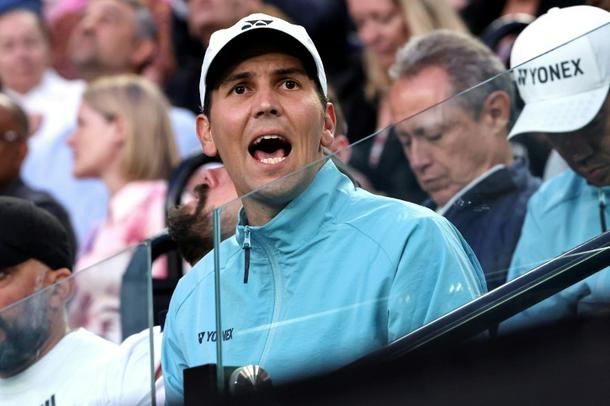
Banned: Stefano Vukov, the coach of former Wimbledon champion Elena Rybakina
Dubai (AFP) - Iga Swiatek believes the WTA’s decision to ban Elena Rybakina’s coach Stefano Vukov for breaching the tour’s code of conduct should be respected and that the process behind it should be trusted.
Earlier this week, the WTA announced that the independent investigation into Vukov’s potential breach of the code has concluded and that his suspension “remains in place”.
The tour did not reveal the length of the suspension, nor the specific code of conduct that was breached.
However, sources told The Athletic that Vukov was reported for verbally abusing Rybakina, who has denied such claims and has repeatedly said she is against the WTA’s decision.
The former Wimbledon champion said earlier this month that she was still in contact with Vukov and has spent time with him, and her new coach Davide Sanguinetti, during a training block in Dubai.
“I guess everybody needs to respect the decision because we need to trust that the whole process was made with right rules,” world number two Swiatek told reporters at the Dubai Championship on Sunday.
“Every personal trainer, every coach, they need to kind of accept the code of conduct when they want to be on WTA.
“So for sure I hope the WTA is doing everything to make it a safe environment.”
American world number three Coco Gauff did not feel comfortable discussing Vukov’s suspension, given Rybakina’s opposition to the WTA’s decision, but added that she believes in the tour’s right to protect its players.
“From my understanding, I know she doesn’t like the decision. I know WTA also has the right to protect her,” said the 20-year-old Gauff.
“Overall, I think it’s nice that the WTA is making sure that they’re out there to protect players.”
The WTA has upped its safeguarding efforts since last year, and has been encouraging players, team members, personnel and travelling media that are within their environment, to report any behaviour that can be construed as abuse.
- ‘Dirty laundry’ -
The tour has offered ways for reporting to be done anonymously and has a safeguarding course on its platform that is mandatory for anyone in close contact with players on the circuit.
“I definitely think that that’s important in our sport because a lot of times if you look, sometimes victims don’t even know they are a victim,” added Gauff.
“In this sport it’s happened so many times. A lot of times you see former players speaking out years after their career ended how they were treated.”
World number five Jessica Pegula, who is on the WTA Player Council, believes the tour is taking important steps towards safeguarding, and admits “tennis is just not a healthy sport for women as far as, like, you’re very secluded from a young age.
“You’re mentally travelling every single week. You’re with a lot of different people. A lot of times your family can’t come with you. When you start doing that at ages 13, 14, 15, it can go sideways fast. I think we’ve learned that from a lot of the cases back in the day.”
The WTA said it will not be releasing any details on the investigation into Vukov “to protect the confidentiality and integrity of the investigation and its findings.”
The lack of transparency has raised question marks but Pegula believes privacy is a key component for the safeguarding initiative to actually work.
“I think when it comes to things like that, privacy I think is really a priority. I know if I had something similar, I don’t think I would want anyone airing my dirty laundry of maybe the incident or what happened or the people that were involved,” said the American.